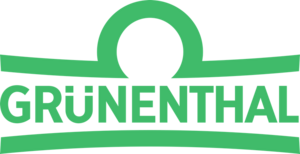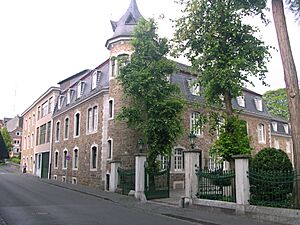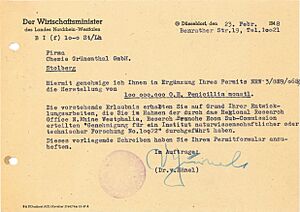Grünenthal facts for kids
 |
|

Headquarters of Grünenthal
|
|
|
Formerly
|
Chemie Grünenthal |
|---|---|
| private company (GmbH) | |
| Industry | pharmaceutical |
| Founded | 29 January 1946 in Stolberg, North Rhine-Westphalia, Germany |
| Founder | Hermann Wirtz, Sr. |
| Headquarters | Aachen, North Rhine-Westphalia, Germany |
|
Number of locations
|
|
|
Areas served
|
+100 countries worldwide |
|
Key people
|
|
| Products |
|
| Revenue | |
| Owner | Wirtz family |
|
Number of employees
|
|
| Footnotes / references Corporate Profile |
|
Grünenthal is a pharmaceutical company based in Aachen, Germany. It was started in 1946 as Chemie Grünenthal and has always been owned by the same family. This company was the first to bring penicillin to the German market after World War II, once the ban on it was lifted.
Grünenthal became well-known in the 1950s and 1960s for creating and selling a drug called thalidomide. This medicine was sold as a sleeping pill named Contergan and was also promoted to help with morning sickness during pregnancy. Sadly, thalidomide caused serious birth defects, miscarriages, and other health problems. Even though these side effects were clearly shown in 1959 and 1962, Grünenthal kept selling the drug for many more years.
Today, more than half of the company's money comes from pain medications like Tramadol. Grünenthal has offices in Germany and other countries, including Europe, Latin America, the US, and China.
Contents
Company History
Chemie Grünenthal was founded in 1946 by Hermann Wirtz, Sr., in Stolberg (Rhineland). Later, its name changed to Grünenthal GmbH, and its main office moved to Aachen. After World War II, the Allied Control Council had stopped German companies from making penicillin. When this rule was removed, Grünenthal was the first to bring penicillin to Germany. This helped the company grow a lot financially.
The Thalidomide Story
Grünenthal created thalidomide in 1954 and got a patent for it that would last 20 years. Soon after, in November 1956, they started selling a medicine called Grippex, which contained thalidomide, to treat colds. Researchers at Grünenthal also thought the drug could help pregnant women with morning sickness, even though they didn't test it on pregnant women. In 1957, the company started selling thalidomide as Contergan.
In 1958, doctors in Germany noticed an unusual number of babies born with deformities. At first, people thought nuclear tests were the cause. But by late 1961, researchers discovered that Contergan was the problem. Because of this, thalidomide was taken off the market in November 1961.
Thalidomide caused severe birth defects in children whose mothers took the drug during pregnancy. Experts believe that thalidomide led to the deaths of about 2,000 children and caused serious birth defects in over 10,000 children. About 5,000 of these children were in West Germany. It's important to know that at that time, medicines didn't have to be tested for effects on unborn babies. Thalidomide had only been tested on rodents, which was common practice back then.
In the UK, a company called The Distillers Company sold thalidomide as Distaval. They claimed it was completely safe for pregnant and nursing mothers. Around the world, many other drug companies also started making and selling thalidomide under different names.
In the US, the Food and Drug Administration (FDA) refused to approve thalidomide for sale. However, the drug was still given out for testing. The FDA official in charge, Frances Oldham Kelsey, was careful and asked for more test results. Even though the drug was not approved, 17 children were born with problems caused by thalidomide in the US.
A family in New York sued the drug maker after their twins were born with deformities in 1961. Their son was born without arms, and their daughter had internal problems. The mother had brought the Contergan tablets from Germany. The lawsuit said that Grünenthal was careless in testing thalidomide and didn't warn about its dangers for unborn children.
Because of the thalidomide scandal, health laws in West Germany became much stronger. New rules for testing medicines were created, and the Federal Ministry of Health was set up in 1962.
Paying for Damages
In 1970, Grünenthal paid 100 million DM to a foundation for disabled people. The German government also paid 320 million DM. Later, in 2008, Grünenthal announced it would pay an extra €50 million to the Thalidomide Foundation to help victims.
An Apology
In August 2012, after 50 years, the company finally said sorry. Harald Stock, Grünenthal's chief executive, said the company regretted the effects of the drug. He also said they had failed to connect with the victims and their mothers over the years.
Thalidomide for Leprosy
In 1964, a doctor discovered that thalidomide could help treat leprosy. Since the 1970s, Grünenthal has provided thalidomide to leprosy clinics under strict rules and with an agreement from the World Health Organization. The drug is very helpful for treating a painful skin reaction that people with leprosy can have.
Other Drug Developments
Grünenthal now focuses on making medicines for pain. They do their own research in this area. The company developed the drug Tramadol, which is sold as Tramal, and is one of the most popular painkillers. They also work on medicines for gynecology, dermatology, and anti-infectives.
In 2018, Grünenthal bought the rights to pain-related medicines like Nexium and Vimovo in Europe, and Qutenza in the US. Nexium has since been taken off the market because it caused kidney damage. This drug also did not have enough testing before it was sold.
Helping the Community
In 1998, Grünenthal started the Grünenthal Foundation for Palliative Medicine. This foundation helped create the first university program and clinic for palliative care (care for people with serious illnesses) at the RWTH Aachen University in 2010.
Since 2004, Grünenthal has supported young scientists with the EFIC-Grünenthal-Grant. This is the world's largest prize in its field, giving €200,000 to help with research projects.
The company is also part of social initiatives like the Charta of Diversity and is a founding member of the Voluntary Self-Regulation in the Pharmaceutical Industry.
See also
 In Spanish: Grünenthal GmbH para niños
In Spanish: Grünenthal GmbH para niños
 | Aurelia Browder |
 | Nannie Helen Burroughs |
 | Michelle Alexander |



